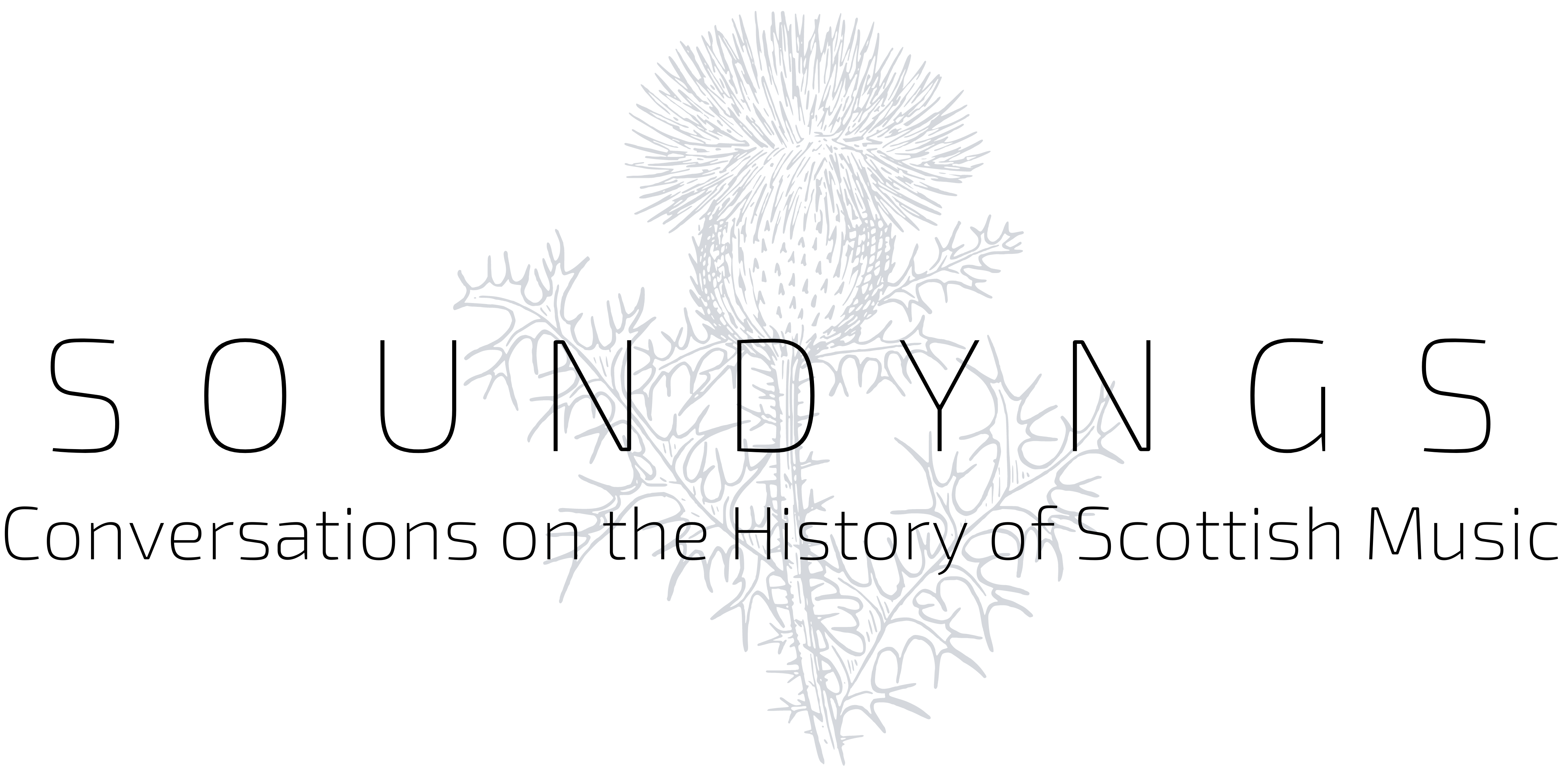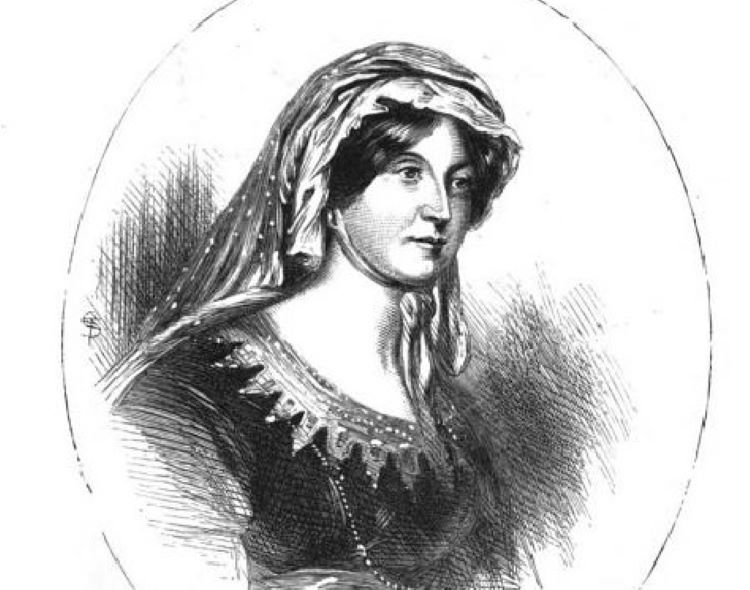Freeland Barbour, accordionist, composer, radio and record producer, is a descendent of Lady Nairne’s sister, and this alongside his own practice-based knowledge of Scottish songs positions him to write this recent biography (2019) of an important figure in Scotland’s national song tradition.
Featured image: from Charles Rodgers, Life and Songs of the Baroness Nairne, with a memoir andpoems of Caroline Oliphant the Younger, frontspages, Google books.
Barbour is an experienced stage performer, and this relatively short book has the feel of an oral tale told to an audience, perhaps round a fireside on a long winter night. Like any genealogist of ancient times, we start with a sketch of the Oliphant family background, reaching back to the arrival in Scotland of the Norman French, including their presence at the signing of the Treaty of Arbroath; by 1320, obviously naturalised as Scots. Over time, their loyalty to the Scottish monarchy is asserted as a continuous family tradition.
From chapter 2, we hear about Carolina Oliphant (1766-1845), born in Gask, Perthshire, and named after Bonnie Prince Charlie. Her parents Laurence and Margaret Robertson of Strowan had experienced a period of exile in France after Culloden, and even after they returned back home, kept a relatively low social profile; this was clearly a family whose hearts were still very much with the Jacobite cause. Carolina and her sisters were fairly late to marry by the standards of the time. Carolina lived in the family home in the much-loved ‘Auld Hoose’ (the subject of one of her best known songs, demolished in 1801, and celebrated by Nairne in the 1820s), until her father died in 1792. Carolina’s affection for Gask also features in ‘The Rowan Tree’.
Like many Scottish women of her class, she learnt music as a young person; in her case, from a local fiddler, who taught her Highland songs. Nairne also moved in social circles that brought her into contact with Neil Gow and his son Nathaniel, learning tunes from them which she furnished with her own lyrics. This music gave her a legitimate way to express her cultural affiliations. In the 1780s and 90s, she was aware of Robert Burns’s work collecting and ‘improving’ the lyrics of Scottish songs, and increasingly bent her own poetry to that end.
Her specialism was Jacobite song, transformed by the post-Culloden situation into a poetics of nostalgia. Some songs were her own; many others, she found and reshaped with new or amended lyrics, fit for drawing room performance. She had a particularly fluency in Scots language poetry, but was also happy (as most of her generation were) to write in English. Around 80 new songs, many now central to the ‘traditional song’ canon, can be directly attributed to her pen, including:
- Charlie is My Darling – several versions of this song exist from different hands, but Lady Nairne’s is possibly the most famous, first published with music in The Scottish Minstrel.
- A Hundred Pipers
- The Rowan Tree
- Will Ye No Come Back Again
- The Laird of Cockpen – an old tune and title, but new lyrics by Lady Nairne
- Caller Herrin’ – based on street cries of fishwives from Musselburgh, near her Edinburgh home
- The Land o’ the Leal – written in 1798, originally to be sung to ‘Hey Tutti Tati’, the old war song of the Bruce and more recently, the Jacobite cause
Women of Lady Nairne’s social class did not usually publish in their own names in this period, and her marriage to her second cousin William Murray Nairne, who worked for the Hanoverian government as Assistant Inspector-General of Barracks in Scotland, made her work additionally sensitive, given the political inferences of these songs. Living in Edinburgh also made it much harder to be a secret domestic Jacobite. Much of Lady Nairne’s work was not openly attributed to her: during her lifetime her songs were either circulated anonymously or published under pseudonyms – famously, ‘Mrs Bogan of Bogan’, her pen name for work submitted for The Scottish Minstrel (1821-24) anthologies published in Edinburgh by Robert Purdie. Almost certainly, she received no payment for these: this work is from a true amateur, in every sense of that word – a lover of Scottish song. Her authorship only became known after her death, when in 1846 the collection Lays from Strathearn appeared with her real name clearly on the title page; possible only because by that point, Lady Carolina was no longer alive to protest and defend her anonymity. By this time, the Jacobites had been safely repackaged into a nostalgic past by the novels of Walter Scott. So popular was the book that even Queen Victoria owned a copy and apparently held it in high regard.
Much of this information is already known, but Barbour’s book brings to the topic new material from family papers that helps us to understand the mindset and social contexts of these songs, an easy-to-read writing style that makes this topic accessible to the general reader, and the musical sensibility of an active Scottish musician. Access to family papers and memories show the reader that Lady Nairne was a pious, gentle and kindly woman: perhaps she would have been found living in a more public gaze uncomfortable.
This book, and the accompanying new edition of The Lays of Strathearn, also represent a powerful statement of advocacy for Lady Nairne and her songs. Those wanting to sing this repertoire should read Barbour’s biography. My one caveat is that the notes in the book could do more to clarify the publication sources for the song illustrations, but for that you might want to look in Barbour’s companion volume, The Lays of Strathearn (2019). The lack of academic apparatus flags this as a general reader’s book rather than an academic monograph, and the tale it tells is a clear tale.
Further Reading
- Freeland Barbour’s website.
- Freeland Barbour, The White Rose of Gask: The Life and Songs of Carolina Oliphant, Lady Nairne (Edinburgh: Birlinn Ltd, 2019)
- Freeland Barbour, The Lays of Strathearn (2019) – a new edition of Oliphant’s songs.
- William Donaldson, ‘Oliphant, Carolina, Lady Nairne (1766-1845)‘, Oxford Dictionary of National Biography (2004) – with additional bibliography.
- Carolina Oliphant, Lady Nairne, with accompaniments by Finlay Dun, Lays from Strathearn (Edinburgh: Paterson & Sons, first edition 1846), 1860 digitised copy in the Glenn Collection of the National Library of Scotland.

